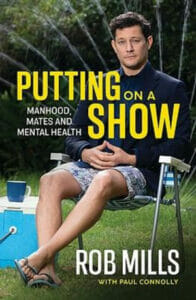
As I wrote on my business Facebook page in January “I heard this interview [with Rob Mills] recently on the radio, and made a mental note to keep an eye out for the book. Then when in a bookshop the other day, I saw it, so having had a quick scan of it, thought it looked interesting and bought a copy. Apart from the other issues covered, it also refers to the implications of COVID-19 and the impact of the various lockdowns and related matters, i.e. rather topical.”
I’ve now finished the book and have suggested it to various client’s even before I finished it.
It has the added bonus (apart from being in 100 public libraries) of being available as an audiobook – particularly relevant for those not really into reading books.
His style of writing is also rather jocular, revealing his feelings and experiences while also using some rather colourful language that many blokes will relate to.
He writes early in the book about how “The catalyst that led me to writing it, [the book] however, was COVID-19. In 2020, during Melbourne’s long lockdown I lost a couple of mates to cancer.” He goes on to explain how he was unable to attend the funeral’s, due to border issues, and was unable to pay his respects as he would have liked.
Rob covers a lot of “territory”, with the initial catalyst for the book, being an expansion of his observations published in the article published in The Age and Sydney Morning Herald.
In Rob Mills book, to my eyes, one of the themes in Putting on a show” is the idea that it is important for guys to have mentors and positive role models. Particularly for guys as they are growing up.
Reading his book, I was reminded of Steve Biddulph’s (quite different and more academic) but classic 1999 book “Manhood: an action plan for changing men’s lives”. (With 12 editions and listings in 105 libraries via the National Library of Australia’s Trove catalogue.) I was also reminded of the ABC TV series “Man-Up” – again about men, mental health and also prompted by a death, in Gus Worland’s case, a mate who died by suicide. (Mills refers to the Man Up tv series towards the end of the book.)
An enduring theme throughout the 23 chapters is the issue of Aussie blokes needing to learn to feel comfortable “opening up” appropriately to mates, friends, family members and the like. As well as the need to develop and work on friendships, rather than try to survive in emotional isolation. He also writes of the benefits of seeing a therapist / counsellor / psychologist as someone who is “a few steps removed” from a bloke’s own life and as I say tend to say help the guy “see the wood for the trees”. (He talks positively about his own ongoing professional relationship with his own psychologist.)
The range of subjects covered include, but not limited to subjects like; Aussie men and archetypes; The impact of the family of origin; Role models and mentors; Changing perspectives on masculinity; Aussie males reluctance to seek help; Suicide; Sexuality issues, including “Coming Out”; The drinking culture in Australia; The need for real mates and friends; Issues about online apps; Men’s groups; The need for blokes to “open up” and Mental fitness, to name a few.
In summary, another good book (or Audiobook) for Aussie Blokes, that looks at ways of improving the mental health of men in Australia, by looking at a collection of issues relevant to current Australian life.




